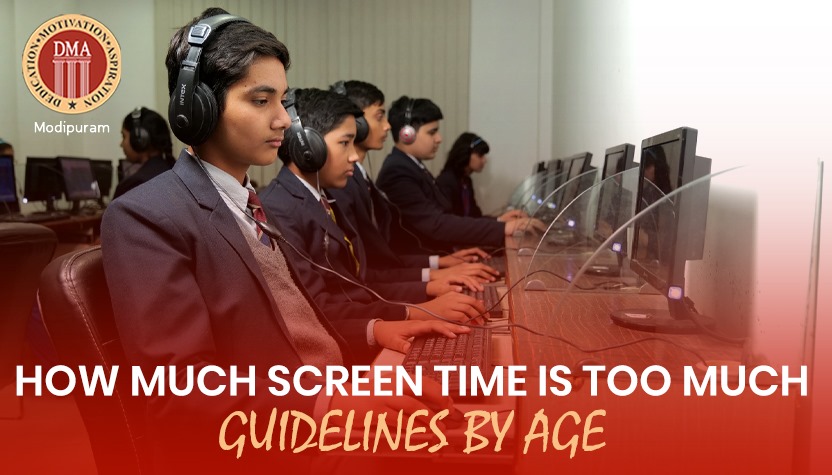Every generation has a different problem growing in their respective period. For today’s generation, the problem is excessive reliance and usage of electronic devices. Whether you’re a proud parent to a teenager or a pre-schooler, you cannot keep your child away from screens for long. From televisions to mobile phones, video games to tablets – screens are everywhere. They have gradually become a part of our daily lives, making it hard to avoid them for longer durations.
While we at Dayawati Modi Academy, one of the top schools in Meerut, do not recommend depriving children of screen time entirely, we encourage parents to control screen time for healthy and balanced usage. The topic of regulating screen time, especially for kids, has sparked a never-ending debate among psychologists, child development professionals, pediatricians, and parents worldwide. Although there are mixed opinions, most seem to favor controlled screen time for apparent reasons.
If your children are always glued to TV, video games, mobile phones, or any other gadgets for an unhealthy longer period, it is recommended that you start imposing strict screen time rules. To make things easier, we’ve done all the necessary research to help parents set ideal screen time for kids of all ages. So, go ahead and read on.
Screen Time Guidelines Based on Age
Children don’t only spend higher screen time because of entertainment or leisure activities; they also use it for educational purposes. While online classes and learning a new skill become easy because of the internet, we at Dayawati Modi Academy still believe there should be reasonable restrictions on screen time for kids.
Even the American Academy of Pediatrics (AAP) echoes similar beliefs. According to this notable institution, parents should stick to the following screen time guidelines for their kids:
- Screen Time for Infants (0-2 Years)
Children this small don’t require any screen time at all. In fact, during this stage, they should be exposed more to face-to-face interactions, gentle physical activities, etc. The only exception for this stage is video chatting with their loved ones, that too, not exceeding a few minutes.
- Screen Time for Pre-Schoolers (3-5 Years)
Pre-schoolers can be exposed to screen time not more than one hour a day. Parents should focus more on physical interactive activities and imaginative play at this stage. Even if you want them to watch cartoons or fun content, ensure pre-schoolers only access age-appropriate content.
- Screen Time for School-Age Children (6-18 Years)
We understand it can be challenging to restrict screen time for kids of this age range because they see everyone using their mobiles most of the day. Additionally, online content can be addictive, making them spend hours scrolling random content. However, if your kids are in the 6-10 age range, ensure they only have up to 2 hours of screen time a day. You also have to ensure that your kids have strict limits on viewing certain types of content.
Since children above 10 years start using the internet to aid their study, it is you, the parents, who must decide an ideal screen time for them. While deciding the screen time, emphasize balancing screen time with your kid’s academic commitments, social interactions, physical activities, and leisure time. You can begin by granting them a 3-hour screen time window and increase/reduce it depending on your observations.
Why Parents Must Regulate Their Kid’s Screen Time?
Screen time is not entirely bad for children because it can be used for educational purposes too! The problem is actually the unregulated screen time. We at Dayawati Modi Academy believe that if all kids remain glued to their phone screens or any other gadget screen for an unhealthy amount of time, they can become prone to several health issues. From developing a sedentary lifestyle to experiencing disturbed sleep patterns regularly – your kids can be affected at all levels.
One of the biggest impacts of unregulated screen time is its social and emotional influence on kids. When kids replace offline interactions with online ones, their interpersonal skills start depleting. They even become more vulnerable to mental health challenges, like depression, anxiety, aggressive behavior, etc. Impaired academic performance and shortened attention span are other common problems arising from unregulated screen time.
This is why we at Dayawati Modi Academy, ranked among the best school in meerut, always encourage parents to set a balanced screen time for their kids while keeping a check on the type of content they view. Kids are naïve; they don’t fully understand what’s right for them. So, it becomes the caregiver’s responsibility to ensure they don’t get exposed to inappropriate content or fall prey to online predators.
Conclusion
Screen time can be beneficial for kids as it lets them unwind after a tiring day. But it will be a valuable tool only if it’s used thoughtfully and within limits. This is why professional child psychologists, pediatricians, and other childcare professionals recommend limiting kids’ screen time for their overall well-being. Today, through this blog post, we would like to encourage parents to talk to their children about the need to control screen time and mutually decide on a healthy limit. It will help ensure that your kids benefit from the digital world while minimizing any ill effects associated with excessive screen time.

